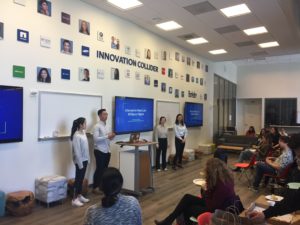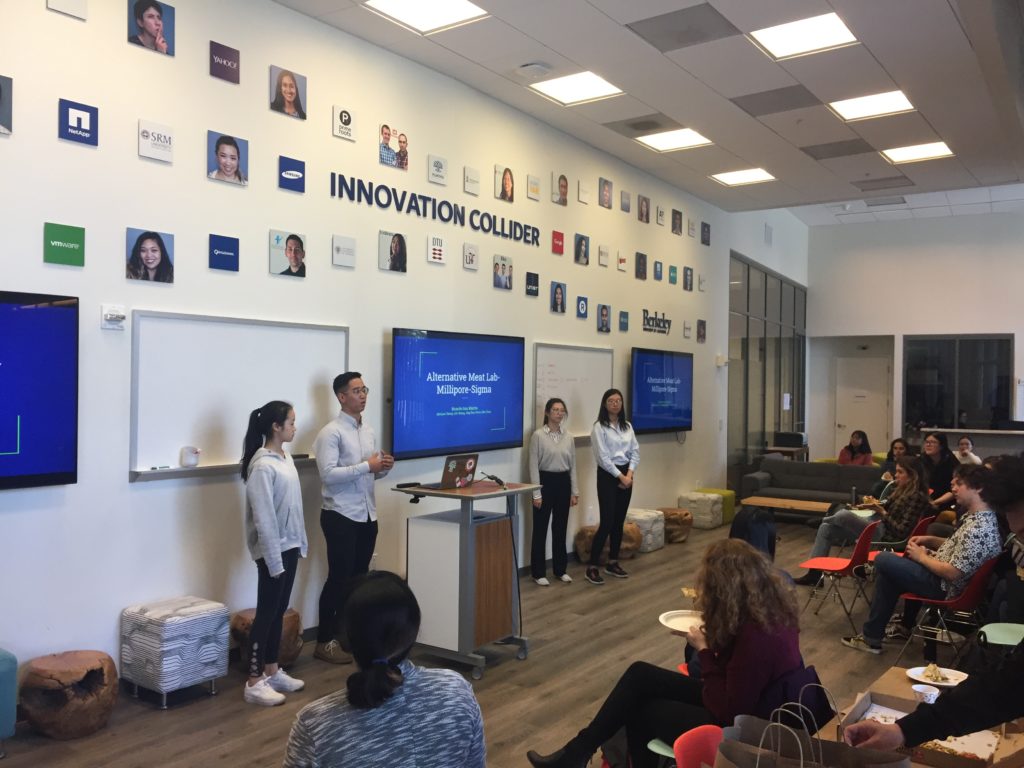Halle Nicole Readfearn doesn’t have to worry about stray eggshell pieces in her breakfast; she doesn’t even have to crack an egg. All she has to do is twist off a black plastic cap.
Readfearn, who graduated from UC Berkeley in 2019, consumes Just Eggs. Retailing at $4.99, the ‘egg’ mixture is actually a liquified mung bean mixture, and has garnered acclaim for cooking similarly to scrambled eggs.
The Just Egg is part of a nationwide, $4.5 billion dollar culinary trend: the consumption of plant-based foods. It’s a trend that Redfearn first got a taste of in Berkeley’s Alternative Meat Challenge Lab course, where she delved into group based project work on behalf of different corporate partners.
“I didn’t know a lot about the tech world of food before coming into the class,” Redfearn said. “It’s interesting to hear the reality of what these food tech companies are facing.”
The Challenge Lab allowed Redfearn to delve deep into the industry, and network with leading professionals.
“I got opportunities that I’ve never gotten before — like to go to lunch with the head of Impossible Foods,” Redfearn said. “This was my favorite class at Berkeley, easily.”
For other students, the class was a springboard into other aspects of the food industry.
“It was really interesting. The class was varied every day, and it was definitely a work in progress but it was cool because the students were participating as well,” Judy Savitskaya said. “There were a lot of interactive components with companies and co-sponsors and I really liked that.”
Savitskaya graduated from UC Berkeley with her Ph.D. in 2019, and currently works at Andreessen Horowitz, a venture capital firm where she focuses on biotech and agricultural companies.
“I had only thought about the biotechnical components of [plant based meat], and I hadn’t thought about the mechanical engineering side or the product development side,” Savitskaya said. “I have experience in biology and bioengineering and I love it and want to work on it, but the application spaces that I care about are the environment, energy, agriculture.”
Despite not directly working on creating alternative meat, Savitskaya found the class to be a beneficial foray into the food scene.
“I’d considered maybe working on a startup after graduating, so I wanted to see what the big questions were in the space, and where I could potentially apply the expertise that I have,” Savitskaya said.
Both Savitskaya and Redfearn attribute their success in the Challenge Lab to professor Dr. Ricardo San Martin.
“Ricardo is fantastic,” Redfearn said. “He’s one of those guys that sees a problem and just needs to do something about it. He doesn’t like to hang on the sidelines, he doesn’t like to hand it off to someone else. He will stretch himself in a million and two directions because he’s genuinely curious about the world, and has the motivation to see it through.”
Dr. San Martin’s projects, however, came with a steep learning curve. Savitskaya remembers her group failing to make an enjoyable plant-based alternative to jerky (“The texture was really problematic”). However, she still appreciated the opportunity to ideate and create new products.
“It’s totally project heavy. The goal is experimenting with some idea and showing some sort of product in the end,” Savitskaya said. “There was a team that did something with encapsulating fats in a polymer to make them stable in eat. They ended up working on the fat portion of bacon, and they actually got it to look pretty good.”
“At some point I gave a lecture on proteins which was cool. I remember each student gave a lecture on an area they were an expert in, so for sure it was like learning in all directions,” Savitskaya said.
For Redfearn, that learning continued outside the class. She jumped at the opportunity to do research the semester after taking the class.
“One of the biggest issues with plant-based meats from a lot of consumers is that it doesn’t bind water or fat very well so a lot of them come out dry,” Redfearn said. As a fix, Redfearn and Dr. San Martin experiment with Quillaia saponins, a molecule from the soap tree, or Quillaja saponaria, found in Dr. San Martin’s native Chile.
“We’re looking at it for micro emulsions that could replace things like eggs or xantham gum which isn’t the best emulsifier,” Redfearn said. “For example, plant based sausages, or burgers, or slushies like anything that involves the emulsions which often use animal products.”
Although Redfearn now works for Santa Clara Foods, she still keeps in touch with Dr. San Martin.
“Ricardo’s class gave me a very good idea, first of all, of what I want to be able to contribute to this space, and also just the importance of what we’re doing,” Redfearn said. “I still see him every month or so to meet for coffee and we just talked about how life is going.”
Redfearn encourages current UC Berkeley students interested in the space to grab any opportunities they can find.
“We are literally in the epicenter of what’s going on. I can’t imagine a place that’s moving quicker in the food tech space than San Francisco and the Bay Area,” Redfearn said. “[Companies are] looking for Berkeley students to come join them because it’s just such a quickly growing space.”
Savitskaya agrees that there is room for growth and innovation in the industry — the taste of alternative meat products “for sure” has catching up to do.
“I mean animal meat is better,” Savitskaya said.
Halle Nicole Readfearn doesn’t have to worry about stray eggshell pieces in her breakfast; she doesn’t even have to crack an egg. All she has to do is twist off a black plastic cap.
Readfearn, who graduated from UC Berkeley in 2019, consumes Just Eggs. Retailing at $4.99, the ‘egg’ mixture is actually a liquified mung bean mixture, and has garnered acclaim for cooking similarly to scrambled eggs.
The Just Egg is part of a nationwide, $4.5 billion dollar culinary trend: the consumption of plant-based foods. It’s a trend that Redfearn first got a taste of in Berkeley’s Alternative Meat Challenge Lab course, where she delved into group based project work on behalf of different corporate partners.
“I didn’t know a lot about the tech world of food before coming into the class,” Redfearn said. “It’s interesting to hear the reality of what these food tech companies are facing.”
The Challenge Lab allowed Redfearn to delve deep into the industry, and network with leading professionals.
“I got opportunities that I’ve never gotten before — like to go to lunch with the head of Impossible Foods,” Redfearn said. “This was my favorite class at Berkeley, easily.”
For other students, the class was a springboard into other aspects of the food industry.
“It was really interesting. The class was varied every day, and it was definitely a work in progress but it was cool because the students were participating as well,” Judy Savitskaya said. “There were a lot of interactive components with companies and co-sponsors and I really liked that.”
Savitskaya graduated from UC Berkeley with her Ph.D. in 2019, and currently works at Andreessen Horowitz, a venture capital firm where she focuses on biotech and agricultural companies.
“I had only thought about the biotechnical components of [plant based meat], and I hadn’t thought about the mechanical engineering side or the product development side,” Savitskaya said. “I have experience in biology and bioengineering and I love it and want to work on it, but the application spaces that I care about are the environment, energy, agriculture.”
Despite not directly working on creating alternative meat, Savitskaya found the class to be a beneficial foray into the food scene.
“I’d considered maybe working on a startup after graduating, so I wanted to see what the big questions were in the space, and where I could potentially apply the expertise that I have,” Savitskaya said.
Both Savitskaya and Redfearn attribute their success in the Challenge Lab to professor Dr. Ricardo San Martin.
“Ricardo is fantastic,” Redfearn said. “He’s one of those guys that sees a problem and just needs to do something about it. He doesn’t like to hang on the sidelines, he doesn’t like to hand it off to someone else. He will stretch himself in a million and two directions because he’s genuinely curious about the world, and has the motivation to see it through.”
Dr. San Martin’s projects, however, came with a steep learning curve. Savitskaya remembers her group failing to make an enjoyable plant-based alternative to jerky (“The texture was really problematic”). However, she still appreciated the opportunity to ideate and create new products.
“It’s totally project heavy. The goal is experimenting with some idea and showing some sort of product in the end,” Savitskaya said. “There was a team that did something with encapsulating fats in a polymer to make them stable in eat. They ended up working on the fat portion of bacon, and they actually got it to look pretty good.”
“At some point I gave a lecture on proteins which was cool. I remember each student gave a lecture on an area they were an expert in, so for sure it was like learning in all directions,” Savitskaya said.
For Redfearn, that learning continued outside the class. She jumped at the opportunity to do research the semester after taking the class.
“One of the biggest issues with plant-based meats from a lot of consumers is that it doesn’t bind water or fat very well so a lot of them come out dry,” Redfearn said. As a fix, Redfearn and Dr. San Martin experiment with Quillaia saponins, a molecule from the soap tree, or Quillaja saponaria, found in Dr. San Martin’s native Chile.
“We’re looking at it for micro emulsions that could replace things like eggs or xantham gum which isn’t the best emulsifier,” Redfearn said. “For example, plant based sausages, or burgers, or slushies like anything that involves the emulsions which often use animal products.”
Although Redfearn now works for Santa Clara Foods, she still keeps in touch with Dr. San Martin.
“Ricardo’s class gave me a very good idea, first of all, of what I want to be able to contribute to this space, and also just the importance of what we’re doing,” Redfearn said. “I still see him every month or so to meet for coffee and we just talked about how life is going.”
Redfearn encourages current UC Berkeley students interested in the space to grab any opportunities they can find.
“We are literally in the epicenter of what’s going on. I can’t imagine a place that’s moving quicker in the food tech space than San Francisco and the Bay Area,” Redfearn said. “[Companies are] looking for Berkeley students to come join them because it’s just such a quickly growing space.”
Savitskaya agrees that there is room for growth and innovation in the industry — the taste of alternative meat products “for sure” has catching up to do.
“I mean animal meat is better,” Savitskaya said.


